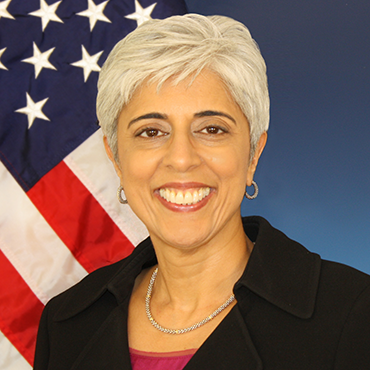The end of DARPA's 'halcyon' days?
The Defense Advanced Research Projects Agency looks for new challenges in a post-Iraq, post-Afghanistan world.

DARPA Director Arati Prabhakar: "If we don't figure this out, we're doomed to a future where we're building PowerPoints instead of building systems."
As the U.S. winds down from more than a decade of combat in Afghanistan and Iraq, the defense agency that created some of the critical technologies used to fight those wars is shifting focus to the next wave of national security concerns. At the Defense Advanced Research Projects Agency, new priorities are emerging as the organization faces altered realities: threats of today and tomorrow are growing more complex, the United States no longer enjoys a massive technological advantage over enemies, and funding for defense is more likely to decline than increase.
"There is recognition that the complexity of the national security threat environment is quite vast, and it continues to be critically important for the country to understand and be ready for whatever a North Korea might do, whatever an Iran might do, where ever China's economic growth and economic development might take it," DARPA Director Arati Prabhakar said Nov. 19 at a Northern Virginia Technology Council event in McLean.
That is happening amid a "shift from a halcyon period in history where we loved having our arms around the leading technologies and having the technical edge that far surpassed what others around the world could do," she said. "It was an unusual period we enjoyed, and it is history."
In the past, the Pentagon's ability to spend vast sums on military technology helped vault the U.S. ahead of adversaries. But even aside from sequestration, furloughs, the Budget Control Act and other sweeping cuts, the need to develop and field technology in a more financially sustainable way is one of the biggest hurdles the Defense Department faces, Prabhakar said.
"I think it is time for our innovation community to think about costs not in an incremental way – this isn't about shaving a couple percent off costs," but about dramatically changing the way complex systems are built, she said. "It's the hardest challenge because it's so counter to the culture of leading-edge technology for national security. But I think that if we don't figure this out, we're doomed to a future where we're building PowerPoints instead of building systems."
One area of focus at DARPA is cybersecurity. Prabhakar emphasized that DARPA does not have an operational role in DOD cybersecurity, but the agency is working to develop a new generation of IT systems that eliminate many of today's problems with security breaches, attacks and an inability to keep pace with a fast-moving cyber threat.
"I would say really all we know how to do is patch and pray," she said. "DARPA is making serious investments in the objective of creating a different trajectory for the future, one in which we can achieve a foundation of cybersecurity," much like the foundational physical security most people enjoy thanks to things like locking doors and alarm systems.
"Many different parts of DARPA are tackling [cybersecurity], including automation – building machines that are able to determine vulnerabilities and patch them automatically," Prabhakar said.
The automated approach to cybersecurity is the central point of the Cyber Grand Challenge DARPA announced in October, a competition for developing fully automatic network defenses.
NEXT STORY: FirstNet seeking Northern Virginia home





